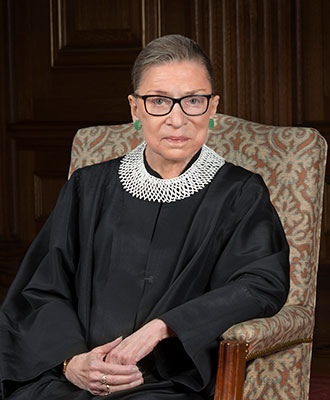On Friday, September 18, 2020, we lost a trailblazer in women’s rights, a staunch proponent of marriage equality, a compassionate legal mind. More than “just” a Supreme Court Justice, Ruth Bader Ginsburg was a hero.
By Christine Fitzgerald, Family Lawyer

Justice Ginsburg was a champion for causes like equal rights, women’s rights, and marriage equality, to name a few. In United States v. Virginia, a case that challenged the Virginia Military Institute’s all-male admission policy, Judge Ginsburg delivered the opinion for the Court. 518 U.S. 515 (1996). In deciding that state-funded schools and universities must accept women for admission, Ginsburg wrote that generalization about women and perceptions about what is appropriate for women “no longer justify denying the opportunity to women whose talent and capacity place them outside the average description.” Id. At 550.
Justice Ruth Bader Ginsburg: A Champion for Marriage Equality
Similarly, Justice Ruth Bader Ginsburg was a staunch proponent of marriage equality. During the hearing on the landmark case, Obergefell v. Hodges. 576 U.S. 644 (2015), Justice Ginsburg is best known for having reminded her colleagues that “[m]arriage today is not what it was under the common law tradition, under the civil law tradition. Marriage was a relationship of a dominant male to a subordinate female. That ended as a result of this court’s decision in 1982 when Louisiana’s Head and Master Rule was stuck down… Would that be a choice that state should be allowed to have [today]? To cling to marriage the way it once was?” Although Justice Ginsburg did not write the majority opinion in Obergefell v. Hodges, she joined the majority in ruling that marriage equality was a fundamental right.
In some ways, Ruth Bader Ginsburg was even more well-known for her thoughtful and exacting dissents than she was for her majority opinions. Recently, in Shelby County v. Holder, the majority invalided a key provision of the Voting Rights Act, which required states with a long history of discrimination to seek federal oversight prior to modifying voting procedures. 133 S. Ct. 2612 (2013). In writing the dissent, Justice Ginsburg began the dissent by stating “[i]n the Court’s view, the very success of §5 of the Voting Rights Act demands its dormancy. Congress was of another mind.
Recognizing that large progress has been made, Congress determined, based on a voluminous record, that the scourge of discrimination was not yet extirpated.” Id. at 2632. Justice Ginsburg went on to state “[t]he sad irony of today’s decision lies in utter failure to grasp why the VRA has proven effective.” Id. at 2651. Finally, Justice Ginsburg concluded saying “[i]n my judgment, the Court errs egregiously by overriding Congress’ decision.” Id. at 2652.
In addition to Justice Ginsburg’s blistering dissents, powerful majority opinions, and eloquent quotes about equality, she inspired young women all over this country to stand up for their beliefs and to shoot for the stars. Ruth Bader Ginsburg was more than “merely” a Supreme Court Justice: she was a hero.
Christine C. Fitzgerald is certified as a Matrimonial Law Attorney by the Supreme Court of New Jersey and a Fellow of the American Academy of Matrimonial Lawyers. Practicing family law since 2007, Christine is admitted to practice in New Jersey, New York, and before the Supreme Court of the United States and U.S. District Court of New Jersey. www.seidenfamilylaw.com
Published on:







